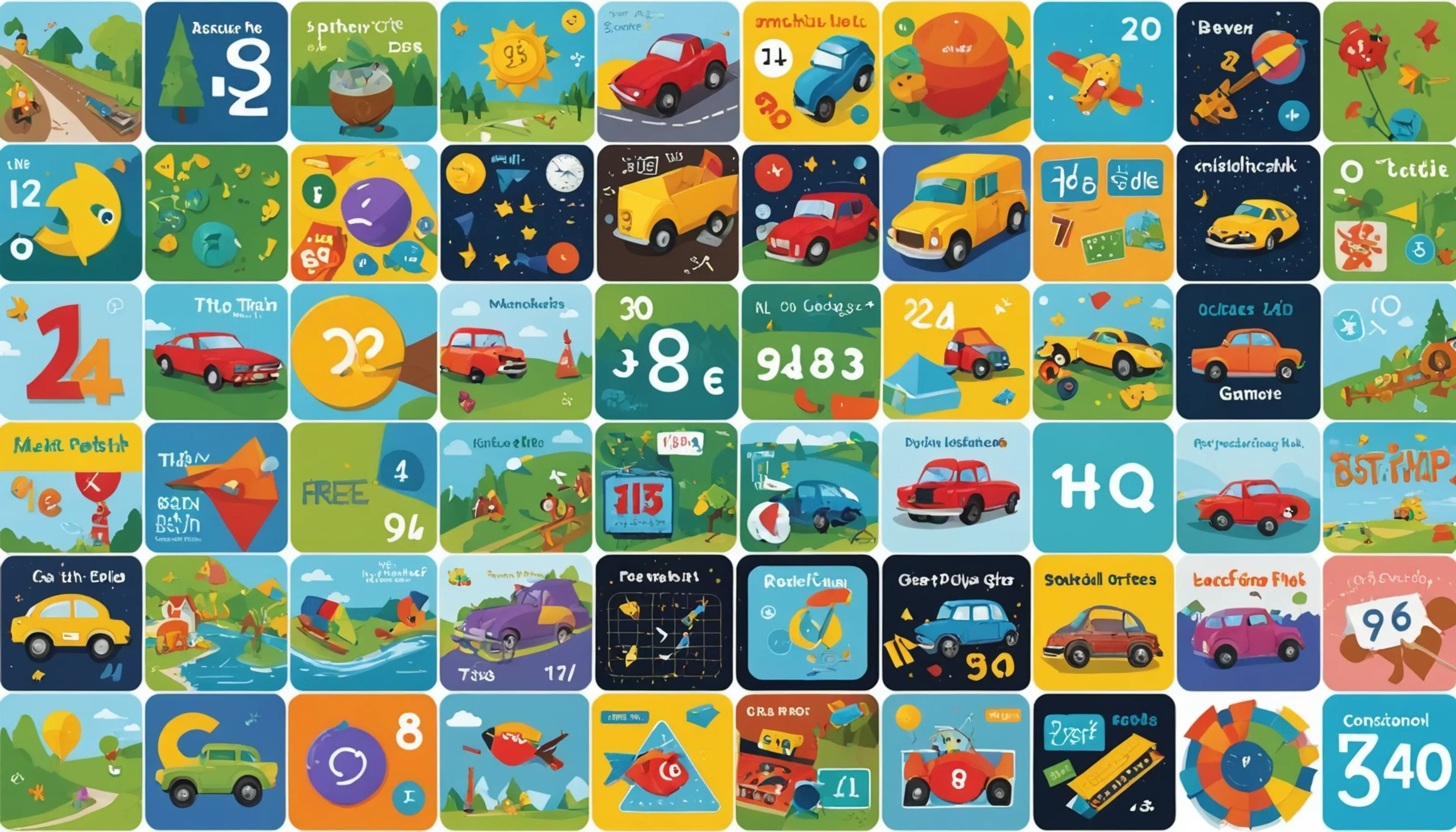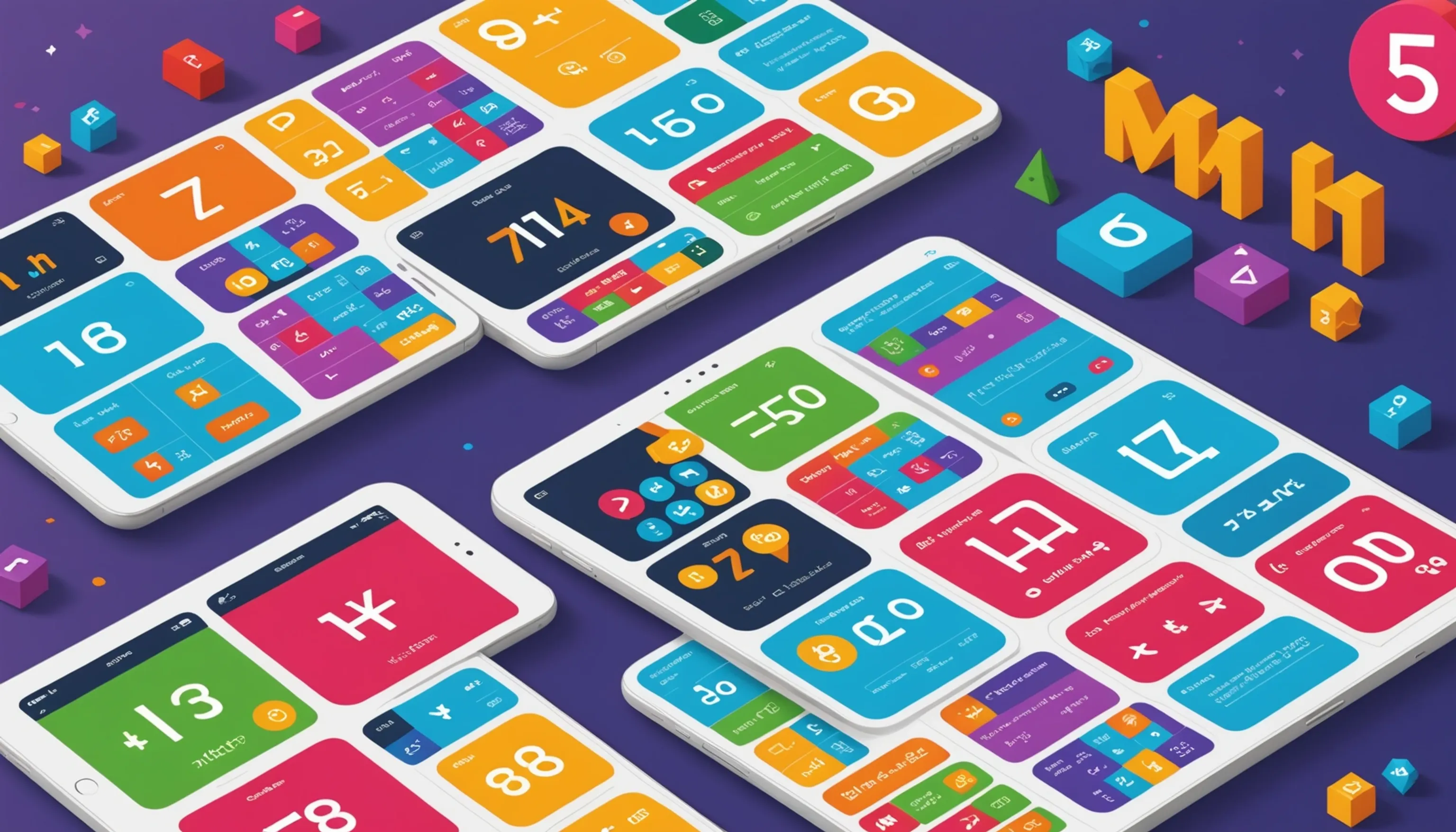Free Educational Math Games
 HvWHenry van Wagenberg
HvWHenry van Wagenberg
Top Educational Math Games for Free
Finding educational math games for free can be a game changer for parents & teachers looking to engage teenagers in learning. These games not only make math fun but also promote critical thinking and problem-solving skills. Here are some top picks:
- Khan Academy: Offers interactive math challenges tailored to different learning levels.
- Prodigy Math: An engaging RPG-style game that makes math practice feel like an adventure.
- Math Playground: Features fun puzzles and games to sharpen math skills.
These platforms provide a rich learning experience without any cost.
Benefits of Math Games for Teenagers
Math games offer numerous benefits for teenagers, transforming the way they engage with mathematics. By incorporating games into learning, students can experience math in a more dynamic and enjoyable way. Here are some key advantages:
- Enhanced Engagement: Games capture teenagers' attention, making learning less of a chore and more of an adventure. This increased motivation can lead to improved performance in math.
- Improved Problem-Solving Skills: Many math games require strategic thinking and problem-solving, helping students develop these essential skills. As they navigate challenges within the game, they learn to think critically and find solutions.
- Instant Feedback: Most online math games provide immediate feedback, allowing teens to understand their mistakes in real-time. This helps them learn from errors and reinforces concepts.
- Collaboration and Social Skills: Multiplayer math games encourage teamwork and communication. Teenagers often play together, fostering collaboration while working towards common goals.
- Personalized Learning: Many educational math games adapt to the player’s skill level, offering customized challenges. This ensures that each student can progress at their own pace, enhancing their confidence.
In summary, incorporating math games into education not only makes learning enjoyable but also equips teenagers with vital skills that will serve them well in academics and beyond.
How Math Games Improve Learning
Math games play a pivotal role in enhancing the learning experience for teenagers by making complex concepts more accessible and enjoyable. Here are several ways in which these games contribute to improved learning:
- Active Engagement: Traditional methods of teaching math can often feel tedious. Math games transform this experience, allowing students to actively participate in their learning process. By solving problems in a fun and interactive environment, they become more invested in mastering mathematical concepts.
- Reinforcement of Skills: Repeated practice is essential in math. Games often incorporate various levels of difficulty, allowing students to practice essential skills repeatedly while keeping the experience fresh and engaging. This reinforces their understanding and retention of mathematical principles.
- Development of Critical Thinking: Many math games challenge players to think critically and strategize. As students navigate through different scenarios, they learn to approach problems from multiple angles, enhancing their analytical skills.
- Building Confidence: The immediate feedback provided by math games helps teenagers identify their strengths and areas for improvement. As they progress and achieve success in the game, their confidence in their math abilities grows.
- Encouragement of a Growth Mindset: Math games promote the idea that mistakes are a part of learning. This encourages students to embrace challenges and persist through difficulties, fostering a growth mindset.
In summary, math games not only enhance engagement but also reinforce skills, promote critical thinking, and build confidence, making them an invaluable tool in education.

Popular Free Math Games Online
There are several popular free math games online that cater to teenagers, making math both fun & educational. Here’s a quick list:
- Khan Academy: Offers personalized challenges across various math topics.
- Prodigy Math: Blends RPG elements with math practice, making it engaging.
- Math Playground: Features a variety of math puzzles & games that sharpen skills.
- Coolmath Games: Provides a range of fun, logic-based games that reinforce math concepts.
These platforms not only enhance learning but also keep students motivated!
Khan Academy: Interactive Math Challenges
Khan Academy is a renowned platform offering a wealth of resources for students, particularly in the field of mathematics. One of its standout features is the interactive math challenges that cater to teenagers at various skill levels. These challenges are designed to make learning engaging and effective.
Through a series of interactive exercises, Khan Academy allows students to practice key math concepts, ranging from basic arithmetic to advanced calculus. Each challenge adapts to the learner's pace, ensuring that they are neither bored nor overwhelmed. This personalized approach fosters a deeper understanding of mathematical principles.
Here are some key features of Khan Academy’s interactive math challenges:
- Immediate Feedback: Students receive instant feedback on their answers, allowing them to learn from their mistakes and reinforce their understanding.
- Progress Tracking: The platform tracks student progress, enabling them to see their improvements over time. This feature motivates learners by showcasing their growth.
- Diverse Topics: From geometry to statistics, the breadth of topics covered ensures that students can find challenges relevant to their current curriculum.
- Interactive Learning: Engaging visuals and gamified elements make the learning process enjoyable, reducing anxiety often associated with math.
In summary, Khan Academy's interactive math challenges provide an exceptional resource for teenagers looking to enhance their math skills while enjoying the learning process.
Prodigy Math: Engaging RPG Style Learning
Prodigy Math revolutionizes math learning by incorporating an engaging RPG (role-playing game) style that captivates teenagers. This unique approach combines education with entertainment, making math practice feel like an exciting adventure rather than a chore. Players create their own avatars and embark on quests that challenge their math skills across various topics.
Here’s how Prodigy Math enhances the learning experience:
- Interactive Gameplay: As students progress through the game, they encounter different challenges that require solving math problems to advance. This interactive format keeps them engaged and motivated.
- Personalized Learning: Prodigy adapts to each student's skill level, offering problems tailored to their current understanding. This ensures that learners are adequately challenged without feeling overwhelmed.
- Rewards System: Students earn rewards, such as new gear for their avatars, as they complete challenges. This gamification aspect promotes a sense of achievement and encourages consistent practice.
- Comprehensive Curriculum: The platform covers a wide range of topics, aligning with common core standards, so students can reinforce what they are learning in school.
- Parental Insights: Prodigy provides parents with reports on their child’s progress, allowing them to track improvements and areas that may need additional support.
In summary, Prodigy Math offers a captivating, game-based learning environment that not only helps teenagers improve their math skills but also fosters a love for learning.

Math Playground: Fun Puzzles and Games
Math Playground is a vibrant online platform that offers a variety of fun puzzles and games designed to enhance math skills for teenagers. This engaging resource not only makes learning enjoyable but also effectively reinforces essential mathematical concepts through interactive play.
One of the standout features of Math Playground is its diverse range of games and activities. Here’s how Math Playground fosters a love for learning mathematics:
- Variety of Games: The platform includes everything from logic puzzles and problem-solving games to arithmetic challenges. This variety ensures that there’s something for every student, catering to different learning styles and preferences.
- Interactive Learning: Students can explore math concepts through engaging scenarios, such as using math to solve mysteries or navigate through obstacle courses. This hands-on approach helps solidify their understanding.
- Skill-Building: Many games focus on specific skills, such as fractions, geometry, and multiplication, allowing students to practice targeted areas where they may need improvement.
- Collaborative Elements: Some games encourage multiplayer interaction, promoting teamwork and communication among peers as they tackle math challenges together.
- Accessible Learning: The platform is user-friendly and can be accessed on various devices, making it easy for students to play and learn anytime and anywhere.
In summary, Math Playground combines fun and education, making it an excellent tool for teenagers to develop their math skills while enjoying the process.
Tips for Parents and Teachers
Supporting teenagers in their math learning journey can be made easier with the right strategies. Here are some effective tips for parents and teachers:
- Encourage Game-Based Learning: Integrate educational math games into study routines. Games like Prodigy Math and Khan Academy can make learning enjoyable and interactive.
- Set Realistic Goals: Help students set achievable learning goals. This can boost their confidence and motivation as they reach each milestone.
- Create a Positive Environment: Foster a supportive atmosphere where mistakes are viewed as learning opportunities. Encourage a growth mindset.
- Engage in Discussions: Talk about math in everyday situations, such as budgeting or cooking, to show its practical applications.
- Monitor Progress: Regularly check in on students' progress in math games and activities. Celebrate their achievements to keep them motivated.
By implementing these tips, parents and teachers can effectively support teens in enhancing their math skills.
Encouraging Game-Based Learning at Home
Encouraging game-based learning at home can significantly enhance teenagers' engagement with math. Here are some effective strategies for parents to foster a love for learning through games:
- Choose the Right Games: Select educational math games that align with your teen’s interests and skill level. Platforms like Prodigy Math and Khan Academy offer interactive challenges that make learning fun.
- Set Up a Game Night: Designate a regular game night where family members play math-related games together. This not only promotes learning but also strengthens family bonds and encourages collaboration.
- Create a Reward System: Motivate your teenager by establishing a reward system for completing game levels or mastering specific math concepts. Rewards can include small treats, additional screen time, or privileges.
- Incorporate Real-Life Applications: Use games as a springboard for discussions about real-life math applications. For example, while cooking, talk about measurements or budgets while playing a shopping simulation game.
- Encourage Reflection: After playing, engage your teenager in discussions about what they learned and how they can apply those concepts in their daily lives. This reinforces their learning and helps them connect math with real-world scenarios.
By implementing these strategies, parents can create an enriching environment that promotes game-based learning, making math a fun and integral part of their teenager's education.
Integrating Games into Classroom Activities
Integrating games into classroom activities can be a powerful way to enhance engagement and learning outcomes for teenagers. Here are some effective strategies that teachers can use to seamlessly incorporate games into their math lessons:
- Start with Icebreakers: Use quick, fun math games as icebreakers to warm up students at the beginning of class. This not only sets a positive tone but also helps students feel more comfortable participating.
- Incorporate Technology: Utilize educational platforms like Prodigy Math and Math Playground during lessons. These interactive tools can be integrated into group activities, allowing students to work collaboratively while practicing math skills.
- Gamify Assessments: Transform traditional quizzes into game-based assessments where students earn points for correct answers. Consider using formats like Jeopardy or Kahoot! to make assessments dynamic and competitive.
- Team Challenges: Organize math challenges where students compete in teams to solve problems or complete tasks. This fosters collaboration and encourages peer learning while making math enjoyable.
- Reflection and Discussion: After completing a game, hold a class discussion to reflect on what students learned. Encourage them to share strategies they used and how they approached challenges during the game.
By integrating games into classroom activities, teachers can create a lively learning environment that not only enhances students' math skills but also fosters teamwork and critical thinking.
